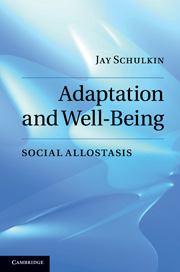Book contents
- Frontmatter
- Contents
- Preface
- Introduction
- 1 Evolutionary Perspectives and Hominoid Expression
- 2 Cognitive Competence and Cortical Evolution
- 3 A Window into the Brain
- 4 Chemical Messengers and the Physiology of Change and Adaptation
- 5 Social Neuroendocrinology
- 6 Cephalic Adaptation: Incentives and Devolution
- 7 Neocortex, Amygdala, Prosocial Behaviors
- Conclusion: Evolution, Social Allostasis and Well-Being
- References
- Index
6 - Cephalic Adaptation: Incentives and Devolution
Published online by Cambridge University Press: 18 April 2011
- Frontmatter
- Contents
- Preface
- Introduction
- 1 Evolutionary Perspectives and Hominoid Expression
- 2 Cognitive Competence and Cortical Evolution
- 3 A Window into the Brain
- 4 Chemical Messengers and the Physiology of Change and Adaptation
- 5 Social Neuroendocrinology
- 6 Cephalic Adaptation: Incentives and Devolution
- 7 Neocortex, Amygdala, Prosocial Behaviors
- Conclusion: Evolution, Social Allostasis and Well-Being
- References
- Index
Summary
INTRODUCTION
We live in a social world with exorbitant and ever-present rewards: from chocolates to stocks, from achievement to thermal comfort. The search for reward is a constant occupation. It is not very surprising that for centuries the concept of reward and human occupation have gone hand in hand in defining our existence, and of course, more than one species is characterized by the search for satisfaction and the avoidance of what is not pleasing.
Diverse theories about pleasure-seeking and pain-avoidance have dominated our intellectual landscape. Hedonism, in both its ancient and modern forms, describes the endless human search for what feels good and the avoidance of what does not. In the broadest sense, hedonic theories are not wrong when construed in terms of the search for satisfaction; but narrowly construed, on the model of a piece of chocolate, the theory does not characterize the full range of our behavioral dispositions, nor that of other species.
Abstract atoms of sensation cauterized from classical hedonism through David Hume (1984/1739) have never done full conceptual justice to the concept of objects. It is objects that orient us, not simple sensation. We are rooted in a world of objects. It is the sight of the bear that renders us afraid, setting off the transduction mechanisms in a well-designed cephalic system to detect and avoid danger. We are oriented towards the object of fear, not its sensation. That is not to deny sensation, for surely that would be a false claim.
- Type
- Chapter
- Information
- Adaptation and Well-BeingSocial Allostasis, pp. 125 - 144Publisher: Cambridge University PressPrint publication year: 2011



